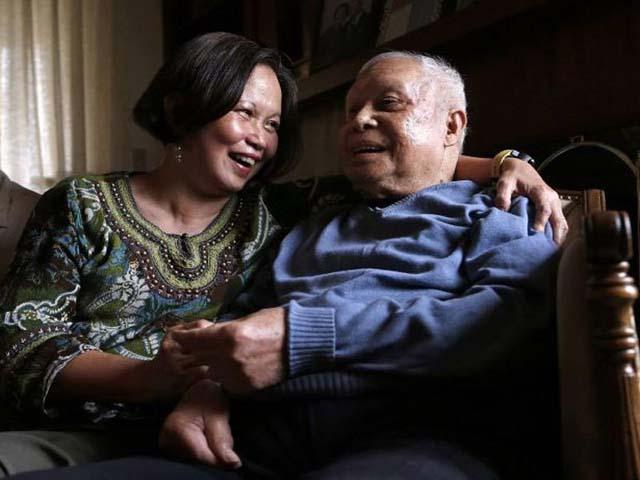Efforts continue to put Pinoy vets' story in US schools
SAN FRANCISCO - Filipino soldiers fought alongside their American comrades in defending freedom in World War II, a fact known to few outside the Philippines and even less here in the United States.
That rankles Cecilia Gaerlan, daughter of a World War II veteran, who takes every opportunity to remind this country of its debt of gratitude to the Philippine troops who enlisted with the United States Army in the Far East or the USAFFE.
Especially this month, April 9, Bataan Day, as Gaerlan leads commemoration of the occasion with a series of events in the San Francisco Bay Area.
Gaerlan and her Bataan Legacy Historical Society are coordinating with Robert McHugh and Memorare Manila 1945 on Day of Valor, or the 74th anniversary of the Fall of Bataan at 8:30 a.m., Monday, April 11, at the Philippine Consulate General.

Cecilia Gaerlan with father Luis Gaerlan, Jr., WWII veteran (41st Infantry Regiment) and a survivor of the Bataan Death March. Courtesy of Cecilia Gaerlan
Master Sergeants Lyndon Del Lago and Stanley Kamiya will bring up the color guard. Consul General Henry Bensurto, Jr. will welcome speakers Vice Admiral Charles Ray, Commander, Coast Guard Pacific Area and Defense Force West; Pearl Harbor survivor Chief Johnny Johnson, USS San Francisco, and Ray Cordoba, a veteran of the Vietnam War and former dean of Lowell High School whose father was a Philippine Scout and Bataan Death March survivor.
An exhibit on WWII in the Philippines will be on view at the consulate on April 11-29. Throughout the month, Caring for Our Heroes provider resource fairs will take place in Union City (April 16), Daly City and Vallejo (April 17), and Sacramento (April 18). Maj. Gen. Antonio Tagubawill be the guest speaker.
Gaerlan has an overarching objective to preserve the Filipino soldiers’ contribution for succeeding generations.
She is working to have certain facts memorialized in the curriculum of high schools in the Golden State. Initiated in 2014, the effort targets Grades 10 and 11 in "all school districts."
"The more monumental task is in getting the history teachers to teach this," she told this writer. "We are already starting the process of creating a curriculum template that will be historically accurate and will reflect the perspective of those who were in the Philippines during WWII."
Gaerlan also wants to correct "some inaccuracies in the proposed text of the history curriculum" to state that the Filipino soldiers actually served under the same command as the American soldiers—USAFFE—as well as the "bigger significance" of the Battle of Bataan.
"Most books only know the Fall of Bataan as the largest single surrender in military history," she said. "Despite suffering from massive diseases and starvation and fighting without any air support as a result of the Europe First Policy, the USAFFE troops performed a delaying action that disrupted the timetable of the Imperial Japanese Army of 52 days, defending Bataan for 99 days. They exceeded their mandate of performing a delaying action by 47 days which gave the Allied Forces the time to harness the resources that eventually led to their victory."
Gaerlan's effort parallels the advocacy for the Filipino farm worker leaders who united with Mexican workers and sparked the Grape Strike of 1965. Their tenacity gained the attention and support of influential people and led to the unionization of California farm labor, a fact now recorded and taught in state schools.
"Their story of sacrifice and heroism should be learned by each and every student here in the US and even in the Philippines and Japan," stressed Gaerlan. She takes pride in their "story of great sacrifice because majority of those who fought and died were Filipinos.
Gaerlan depicts the fate met by the brave warriors:
"When the Philippines was invaded on December 8, 1941, training for the Filipino soldiers barely started. They were given WWI artillery and equipment, many of which were defective, and because Bataan was not prepared as called for under the War Plan Orange 3 (MacArthur changed the plan to meet the enemy on the beaches in Sept. 1941), the soldiers were already on half rations by early January and by March on quarter rations. Quinine, the cure for malaria was no longer distributed by February so there was rampant malaria aside from dysentery, beriberi and other diseases.
"By the time of the surrender on April 9, there were no longer any reserve troops and only two days of quarter rations left. Despite promises that help was on the way, little did they know that their fate was already sealed. Between January and April 1941, there was a series of Conversations between the British and the Americans, setting the foundations of the Europe First Policy. This was sealed during the Arcadia conference in Washington DC with President Roosevelt and Prime Minister Winston Churchill in December 1941 to January 1942.
"In February 1946, just five months after the war ended, under the First Rescission Act the U.S. declared the service of the Filipinos during the war as not full time, thereby denying them of their veterans' benefits."
The United States dealt gross injustice upon the Filipinos, but the ultimate injustice is for fellow Filipinos' apathy to efforts of those like Gaerlan to enshrine the unsung heroes of WWII heroes in U.S. annals.
For more information on related events, visit www.bataanlegacy.org or call the Philippine Consulate (415)433-6666 x 313. —Philippine News




